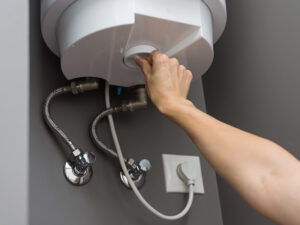A water heater is a necessity in the Burlington climate, but how often should you drain a hot water heater to ensure optimum efficiency? Homeowners may not realize how much an efficient hot water heater can improve the quality of life through comfort and cost savings. A water heater that works well makes cooking and cleaning more manageable and saves on monthly utilities, and maintenance is vital.
As the leading plumbing and HVAC provider in Burlington Township, NJ, Davis Plumbing has decades of water heater repair and replacement experience. The licensed and insured HVAC contractors promise exceptional customer service and world-class repair and maintenance work for whatever you need. When the time comes, investing in water heater replacement in Burlington by Davis Plumbing is a great choice that will offer benefits beyond expectation.
But, how often should you drain a hot water heater? The Davis Plumbing experts cover the timeline, benefits, mechanics, and frequently asked questions below.
The Benefits of Draining Your Water Tank
There are countless benefits to draining a water heater regularly, including a boost in overall efficiency.
Lower Energy Bills
Can draining a water tank save money on energy bills? Yes. It takes longer to heat a calcified water tank which means that the tank needs to exert more energy to produce hot water. Letting our experts drain and flush your water heater solves the problem and conserves a considerable amount of energy long-term.
Reduced Noise
Noises emanating from a water tank heater indicate an issue. Typically, the cause of the noise is scale buildup, which also decreases the efficiency of the heating unit. Draining the tank often helps.
Fewer Odors
When sediment builds up in a water tank heater, it often causes foul odors. The smells tend to permeate throughout the home, and draining the system should eliminate the contaminants. The process flushes stagnant or contaminated water out with a fresh supply, especially if you do not use the tank frequently.
The Mechanics of Water Heater Tanks
How does the water heater work, and is there a right way to drain and refill it? Here is what you need to know from the professionals at Davis Plumbing.
How Does a Hot Water Heater Work?
Hot water heater maintenance works by draining and repairing the tank, not just flushing its water supply for a fresh refill. Both draining and flushing help to eliminate sediment and other contaminants, but consistency is key. Part of our professional service is to maintain the tank with regular draining that handles all contaminants, odors, sediment, and stagnant water so that the mechanism returns to optimum efficiency.
How often should you drain a hot water heater or tank, though? Plumbing experts like us recommend draining it at least once a year and flushing it every six to eight months.
How To Drain Your Water Heater Tank
Professionals recommend draining the water tank before flushing it. Be sure to turn off the water supply to allow the heater to drain the unit safely. It is also necessary to put off electrically-sourced heat and gas in your home during this process (the water heater should be off at this point).
The best approach is to shut off everything and let the tank water cool down overnight. Doing so will reduce the chances of injury while draining the tank. When you are ready to begin the next day, attach a hose to the drain valve, twisting the nozzle to open the valve and allowing the water tank to drain.
While your system flushes, our professionals often turn on a faucet to accelerate the draining process. Drain cleaning can be a lengthy process, and a reputable plumbing company like us will ensure that it goes smoothly. It is crucial to drain the water heater tank properly and with safety precautions, and this may mean repeating the process several times to eliminate all the sediment from the tank.
Refilling Your Hot Water Heater Tank
Once the tank drains, the next step is to refill it with clean water.
- Secure the valve after the draining process.
- Remove the hose from the valve.
- Turn on your water supply to release fresh water into the tank.
Our team recommends running the cold water supply after flushing for even better longevity for the water heater tank.
Frequently Asked Questions: Water Heater
How often should you drain a hot water heater with the process above? There are many factors that may influence this answer, which is why using our water heater draining services can take the stress out of the process. Here are other common questions we hear about our water heater services in Burlington, New Jersey.
How Long Does It Take to Drain a Hot Water Heater?
A hot water heater could drain in approximately one hour, but this will depend on the sediment in the tank. It is common to have to flush it multiple times, and hiring our professional contractors is a good idea.
Is It Safe to Drain a Hot Water Heater?
Yes, it is safe to drain your water heater. However, it is crucial to let the water cool overnight before draining it to avoid injury. Scalding water may also cause problems in the drain pipes that will lead to much more expensive problems for professional attention.
How Much Does a Professional Charge for a Water Tank Draining Appointment?
Most professional plumbers like us will be upfront about the cost and process involved. Feel free to call us for more information; we are happy to discuss a cost-effective solution to your water tank drainage issues. We also recommend draining and flushing water tanks during the fall season as there are often better rates at that time of year.
Schedule an Appointment with Davis Plumbing Today
Maintaining a water heater is great for efficiency and affordability long-term. At Davis Plumbing, our New Jersey technicians focus on providing top-notch water heater draining services at fair prices, and we are happy to answer all your questions. We have many resources available to help you learn about water heater maintenance, no matter the make or model.
How often should you drain a hot water heater in Burlington, NJ? Call Davis Plumbing at (609) 349-7870 today to find out more about maximizing the efficiency of your particular unit.



